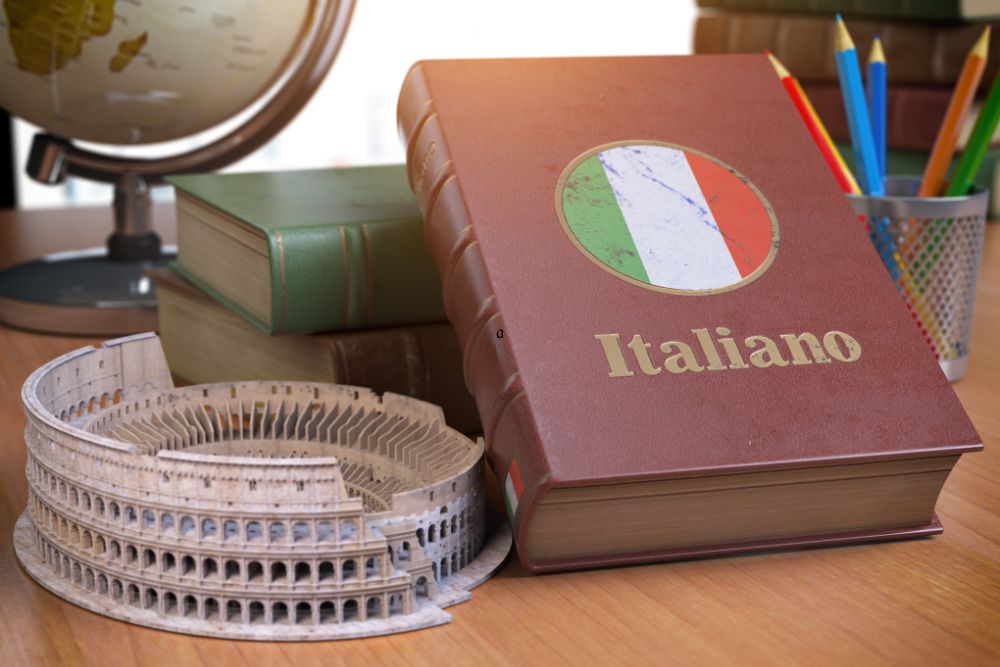Literature serves as a window into the soul of a language and its culture. For language learners, delving into the literary works of a country provides an unparalleled understanding of its idioms, expressions, and cultural nuances.
Italian literature, with its rich history and vibrant contemporary scene, offers a treasure trove of insights for those learning the language.
Reading Italian books not only enhances language skills but also deepens one’s appreciation of Italy’s cultural heritage.
Classic Italian Literature
To truly understand Italian literature, one must start with the classics. These foundational texts have shaped the Italian language and continue to influence its literary tradition.
Here, language use presents more complexity due to the historical context of its creation, but thanks to paraphrases, you can discover an overview of Italian literary history.
Dante Alighieri: “The Divine Comedy”
Dante’s magnum opus, “The Divine Comedy,” is a cornerstone of Italian literature. This epic poem, written in the early 14th century, explores themes of morality, redemption, and the afterlife. It is divided into three parts: Inferno, Purgatorio, and Paradiso. Through his vivid descriptions and complex narrative, Dante provides a comprehensive look at the medieval worldview and the Italian language of his time.
Giovanni Boccaccio: “The Decameron”
Boccaccio’s “The Decameron,” written in the 14th century, is a collection of 100 novellas told by a group of young people sheltering in a villa outside Florence to escape the Black Death. The stories cover a wide range of themes, from love and tragedy to wit and practical jokes. Boccaccio’s work is celebrated for its humanistic themes and realistic portrayal of life, making it a significant piece for understanding the evolution of Italian prose.
Niccolò Machiavelli: “The Prince”
“The Prince,” written by Niccolò Machiavelli in the 16th century, is a political treatise that remains influential today. It offers pragmatic advice on leadership and power dynamics, often characterized by its controversial view on morality and politics. Machiavelli’s work is crucial for understanding Renaissance thought and the political landscape of Italy during that period.
Contemporary Authors
Moving to modern times, contemporary Italian authors continue to capture the essence of Italian society, culture, and language in their works.
Elena Ferrante: “My Brilliant Friend”
Elena Ferrante’s “My Brilliant Friend” is the first book in her acclaimed Neapolitan Quartet.
The series follows the lives of two women, Elena and Lila, from childhood to adulthood in Naples. Ferrante’s narrative captures the complexities of friendship, identity, and social change. Her vivid storytelling and nuanced characters make her books an excellent resource for modern Italian language learners.
Andrea Camilleri: “The Shape of Water”
Andrea Camilleri’s series featuring Inspector Montalbano has garnered international acclaim. “The Shape of Water” is the first book in this detective series set in Sicily.
Camilleri’s use of Sicilian dialects and his depiction of local culture provide readers with a rich linguistic and cultural experience. The engaging plots and colorful characters make his books accessible and entertaining for learners.
Italo Calvino: “Invisible Cities”
Italo Calvino’s “Invisible Cities” is a literary masterpiece that blends fantasy and reality.
The book is a series of conversations between the explorer Marco Polo and the emperor Kublai Khan, describing imaginary cities. Calvino’s poetic and imaginative prose challenges readers to think beyond the literal, offering a unique approach to language learning.

Test your level of Italian
How literature enhances Language learning
Reading literature in the target language offers numerous benefits for language learners.
It exposes them to a wide range of vocabulary and idiomatic expressions, enhancing their linguistic proficiency.
Literature also provides context, helping learners understand how words and phrases are used in different scenarios. Moreover, it introduces learners to cultural references, historical contexts, and social nuances that are essential for mastering a language.
Spaziolingua recognizes the power of literature in language learning and incorporates it into their teaching methodology, with interactive reading sessions, assignments based on literary texts, and cultural discussione.
Teachers at Spaziolingua use literary texts to highlight cultural and historical aspects of Italy, fostering a deeper appreciation for the language and its context.
Embracing Italian Literature in your language learning journey
Exploring Italian literature is a rewarding journey that enriches language learning and provides profound cultural insights.
From the classical works of Dante and Boccaccio to the contemporary narratives of Ferrante and Camilleri, Italian literature offers diverse perspectives and valuable linguistic tools.
Spaziolingua’s literary approach ensures that students not only learn the language but also immerse themselves in the rich tapestry of Italian culture. Dive into Italian literature with Spaziolingua’s courses and unlock the heart of the language through its timeless stories and vibrant characters.







